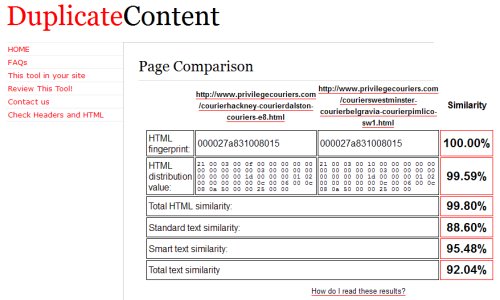Issues with Duplicate Content
As anyone dealing with SEO on a regular basis will know, Duplicate Content is a big deal as far as search engines are concerned. The last thing a search engine wants to do, is return pages of duplicate results of copies of the same pages.
It’s generally accepted that if you want a page to rank well, it needs to be well-written, original content, and not a copy of another page with a few words changed.
A question
Mark, one of the attendees of our SEO Course, posed an interesting question for us:
“I have a question. One of the websites that I showed you on the first week of the course, a UK courier company, has multiple front pages that are very similar, and yet still rank first page in Google. For example, type “courier e8”, “courier sw1”, or “ebay courier loughton” and the company in question appear on the first page with similar pages. There are many more, all near identical pages. Any idea how this gets past the duplication rule for Google?”
Checking for Duplication
There are several tools out there that can help to check whether two pages look like. My favourite is www.duplicatecontent.net – I typed in two of the examples that you provided, and it confirmed that the “e8” and “sw1” pages were very similar.

Using an online Duplicate Content Tool
As you’ll see above, the page layout is almost identical in both cases, but the main body text has been changed a little, and the second page is only 88% identical to the first.
At first glance, you’d be right in being surprised that such a clearly near-duplicate can rank at position 6 in Google – in theory, it should do far worse, as it’s not offering much in the way of fresh, unique and relevant content, compared to similar pages from the same company.
In cases like this, it’s worth looking at the other results in the front page listings. Just about every listing on the front page is for either a directory service (such as Yell.com), or a rival London courier firm who’s doing the same thing (I can see two on the first page). In the example you’ve provided, I’ve looked through the first 30 results, and I’m struggling to find an entry that deserves top spot – i.e. that offers something unique and relevant that is not a near copy of another page, and that explains what you’re seeing.
Google will always return some kind of result – even if it’s for a page that’s not brilliant. In the example you’ve given, there doesn’t seem to be a site that deserves top spot, and so Google has made a decision based on some of the other factors that define a site’s position. In this case, Yell.com and 192.com come out well for London couriers, as they’re respected and trusted directory services. Should a company come along that offers unique content related to “couriers in London E8”, and that site ticks the other criteria Google’s looking for, they may find it fairly easy to overtake some of the duplicated entries that have filtered up to the top.
Although having duplicate content on your site can in many cases hurt your rankings, a well respected site can still do well with duplicated content if there’s nothing to better it. A good example here is the old “how to escape a bear” theory. If you’re with a group of people being chased by a man-eating bear – you don’t need to be able to run faster than the bear, just run faster than the slowest person in the group!
We touch on site reputation, which can make a big difference to performance, in the next week of our course.
Hope that shed a little light…
Add A Comment